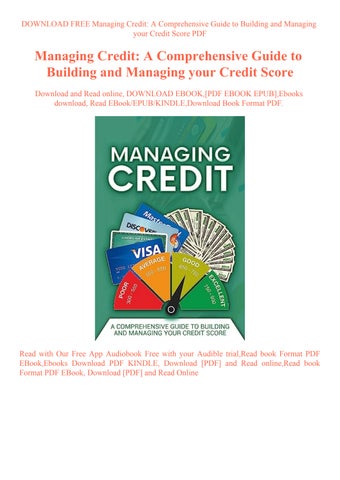Using Catalogues to Better Your Credit Score: A Comprehensive Guide
In today’s digital age, your credit score is more than just a number. It’s a reflection of your financial health, dictating significant life decisions such as purchasing a home, acquiring a new car, or even opening a bank account. For many, a low credit score can be a daunting barrier. However, there’s a silver lining: credit catalogues. These unique tools can be a game-changer for those looking to enhance their creditworthiness.
Understanding Credit Scores
What Determines Your Credit Score?
Every time you borrow money, whether it’s through a credit card, a personal loan, or any other form of credit, you’re essentially building your credit history. This history is meticulously reported to credit reference agencies, which then calculate your credit score.
Your credit score is a numerical representation, indicating to potential lenders how risky it might be to lend you money. The higher the score, the more financially trustworthy you appear. Several factors influence this score:
- Borrowing History: Every loan, credit card, and financing option you’ve ever used plays a role. Regularly using your credit and making timely repayments can boost your score.
- Credit Utilization: This refers to the percentage of your available credit that you’re using. For instance, if you have a credit card with a $10,000 limit and you’ve used $3,000, your credit utilization is 30%. It’s generally recommended to keep this number below 30% for a healthy credit score.
- Payment History: Timely payments can significantly improve your score, while late payments, especially those reported to credit agencies, can harm it.
The Role of Catalogues in Credit Building
What are Credit Catalogues?
Credit catalogues are essentially shopping platforms that allow consumers to purchase goods on credit. Instead of paying the full amount upfront, consumers can repay the amount over a set period, similar to a loan.
There are various types of credit options offered by these catalogues, including:
- Pay Monthly: As the name suggests, consumers can repay their debt in monthly installments.
- Pay Weekly: This option allows consumers to make weekly payments.
- No Credit Check Catalogues: Ideal for those with a poor credit history, these catalogues don’t require a credit check, making it easier for consumers to get approved.
- Credit Lines for Bad Credit: Specifically designed for those with a low credit score, these catalogues offer tailored credit options to help consumers rebuild their credit.
How Catalogues Can Boost Your Credit Score
Credit catalogues are not just about shopping; they’re a strategic tool for those aiming to enhance their credit scores. Here’s how they can be beneficial:
Regular Line of Credit
By opening a credit line with a catalogue, you’re introducing a new form of credit to your financial profile. Regularly using this credit and ensuring timely repayments can positively influence your score over time. Lenders appreciate consumers who demonstrate responsible credit usage, and a credit catalogue can be an excellent way to showcase this.
Demonstrating Financial Responsibility
Every repayment you make towards your credit catalogue is typically reported to credit reference agencies. Timely repayments indicate that you’re a responsible borrower, which can significantly boost your credit score. On the other hand, missed or late payments can have the opposite effect, so it’s crucial to stay diligent.
Reducing Risk for Lenders
A well-maintained credit catalogue account can portray you as a low-risk borrower. By consistently meeting your repayment obligations and managing your credit wisely, you’re signaling to potential lenders that you’re trustworthy. Over time, this can increase your chances of securing larger loans with more favorable interest rates.
Potential Drawbacks of Using Catalogues
While credit catalogues offer numerous benefits, it’s essential to be aware of potential pitfalls:
Higher Interest Rates
Credit catalogues often come with higher interest rates, especially for those with a lower credit score. It’s not uncommon to encounter rates ranging from 16% to as high as 60%. Before committing, it’s crucial to understand the terms and ensure that the interest rate is manageable.
Consequences of Late Payments
Timely repayments are the backbone of a healthy credit score. Late or missed payments can negatively impact your score and remain on your credit report for years. It’s essential to set reminders and prioritize these payments to avoid any adverse effects.
Risks of Carrying Large Balances
While having a credit line is beneficial, maxing it out can harm your credit utilization ratio, a key factor in determining your credit score. It’s advisable to use credit catalogues judiciously and avoid accumulating large balances.
Additional Strategies to Improve Credit Score
Beyond catalogues, there are several other strategies to bolster your credit score:
Paying Credit Card Balances Strategically
Maintaining a low balance on your credit cards can significantly improve your credit score. Aim to use less than 30% of your available credit, and consider making multiple payments throughout the month to keep the balance in check.
Requesting Higher Credit Limits
A higher credit limit, coupled with the same balance, can instantly reduce your credit utilization ratio. If you’ve been a responsible borrower, consider requesting a limit increase from your credit card provider.
Becoming an Authorized User
If a trusted family member or friend has a credit card with a good payment history, consider asking to be added as an authorized user. This can introduce positive credit history to your profile, boosting your score.
Conclusion
Improving one’s credit score is a journey, not a destination. While credit catalogues offer a unique and effective avenue for credit enhancement, they are just one piece of the puzzle. A holistic approach, encompassing various strategies and financial disciplines, is essential for long-term credit health.
The journey to a better credit score requires patience, diligence, and a commitment to financial responsibility. By leveraging tools like credit catalogues and complementing them with other credit-building strategies, individuals can pave the way to a brighter financial future.
